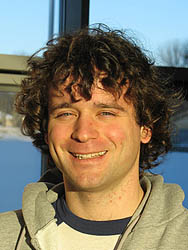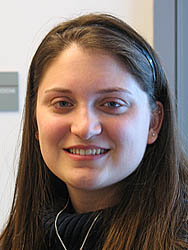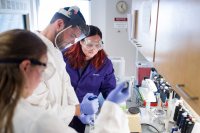
Bates students honored for neuroscience research
A Bates College junior and a recent graduate have been honored for their achievements in neuroscience research at the college.
Leah Carr, a junior neuroscience major from Summit, N.J., was awarded $915 in December by Sigma Xi, the international scientific research society. The award will support a genetics research initiative involving test subjects in the Lewiston-Auburn area.
In November, at the Society for Neuroscience meeting in Washington, D.C., Gregory Sousa of Augusta, Maine, received the top student award presented jointly by two organizations, the Faculty for Undergraduate Neuroscience and the German Graduate Schools of Neuroscience. A biology major, Sousa graduated from Bates in December. The award will pay for a weeklong trip to prominent neuroscience research facilities in Germany.
Carr’s project is titled “The Neurogenetics of Executive Dysfunction in Alexithymia: The Role of the DAT1 Gene.” Working with Nancy Koven, assistant professor of psychology at Bates, Carr is investigating possible genetic involvement in the condition called alexithymia. This refers to a cluster of emotionally related traits, such as deficits in attending to and identifying one’s emotions, that are associated with problems in coping with medical and psychiatric illnesses.
Carr is exploring connections between alexithymia and the functioning of the brain’s frontal lobes; and possible connections between specific brain functions and a gene that regulates dopamine, a neurotransmitter involved in a variety of key mental processes such as behavior, motor activity, sleep, mood and learning.
Working with a test group of 125 adults from the Lewiston-Auburn community, Carr will use saliva samples for genetic analysis and will administer neuropsychological tests to assess cognitive skills such as decision making, inhibitory control, planning and organization, abstract reasoning, attention and working memory.
“I’m very excited to receive this grant, as it is wonderful to know that others view your research plans as worthwhile,” says Carr.
Sousa’s research, conducted for his senior thesis under the guidance of  Associate Professor of Biology Nancy Kleckner, looked at the role of neuropeptides — chemical “signals” in nerve functioning — in the regulation of feeding in pond snails.
Associate Professor of Biology Nancy Kleckner, looked at the role of neuropeptides — chemical “signals” in nerve functioning — in the regulation of feeding in pond snails.
Specifically, Sousa’s work pointed to the involvement of a chemical called neuropeptide phenylalanine as a neurological cue facilitating either the transition to satiation (the sensation of fullness) or a regurgitation movement in the snails.
“A benefit of studying mollusks,” Sousa explains, “is that they contain large neurons that are amenable for electrophysiological recordings — you can penetrate these individual neurons with electrodes and measure how they respond to the application of specific drugs.
“This permits the investigation of biological questions in ways that aren’t feasible in organisms with more complex nervous systems,” he continues. Because of basic similarities between the nervous systems of vertebrate and invertebrate organisms, invertebrate research can often “advance our knowledge of how nervous systems, in general, are able to generate complex behaviors.”
“Winning the award was an incredible surprise,” says Sousa, who plans to visit institutions in Berlin and Munich as he considers grad school. Currently a research assistant at The Jackson Laboratory, in Bar Harbor, he plans to undertake graduate study after two years there. He is working with Simon John, whose research involves the molecular features of complex diseases, particularly glaucoma, that lead to the death of neural cells.
Read more about Sousa’s work and award.
By, Doug Hubley





